June 22, 2025 | 04:44 GMT +7
June 22, 2025 | 04:44 GMT +7
Hotline: 0913.378.918
June 22, 2025 | 04:44 GMT +7
Hotline: 0913.378.918
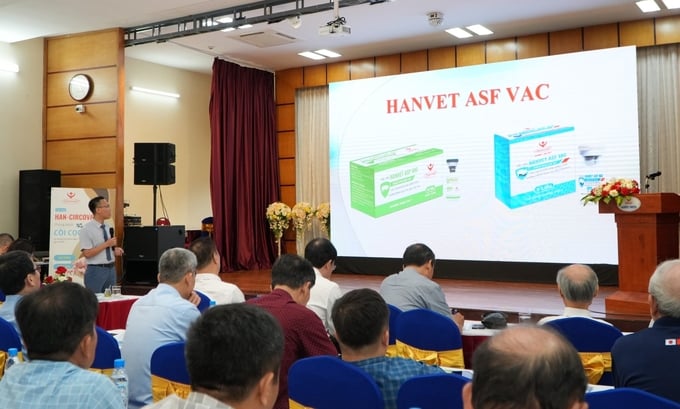
Workshop introducing HANVET ASF VAC vaccine. Photo: Dinh Muoi.
Hanvet Animal Health Pharma and Supplies JSC (Hanvet) announced the successful development of the HANVET ASF VAC vaccine, effectively preventing and controlling African Swine Fever. This achievement comes after a thorough 5-year research effort.
The initial practical use shows significant effectiveness, particularly in sows that offer promising opportunities for pig farmers in light of the advent of African Swine Fever.
According to Dr. Nguyen Huu Vu, the Director-general of Hanvet, HAVET ASF VAC is a freeze-dried attenuated vaccine that is very safe and has strong immunogenicity against the African swine fever virus. The vaccine is manufactured using cell culture, specifically with the HPC (Hanvet Porcine Cell) line. It employs the ASF-HV21 virus, which is an attenuated strain derived from Vietnam. This strain has been genetically edited to remove 12 genes, reducing the likelihood of it regaining its virulence.
The vaccine has undergone thorough research and its composition has been fine-tuned for various pig breeds, leading to the development of two variants of HANVET ASF VAC: one designed for pigs raised for meat production and another specifically for breeding sows. Pigs have an immunological response against African swine fever four weeks after immunization, and this protection is effective for more than four months.
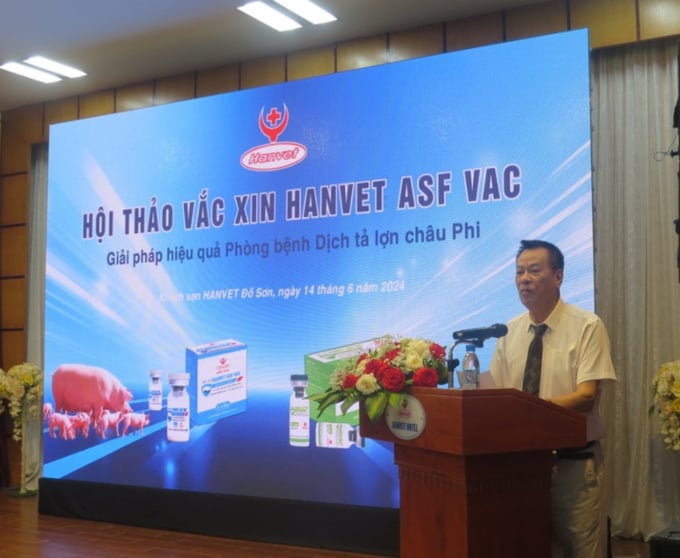
Dr. Nguyen Huu Vu, General Director of Hanvet Company introduced the vaccine. Photo: Dinh Muoi.
The vaccine has demonstrated encouraging outcomes in both controlled laboratory experiments and real-world field tests, attaining an effectiveness rate of 90%. Presently, the company is persistently observing immunized swine till they reach the stage of being suitable for the market, and is also carrying out more extensive field experiments. Additionally, they are currently acquiring intellectual property protection and securing long-term approval for the vaccine.
"The HANVET ASF VAC has demonstrated early success and exhibits significant potential, especially in its application for breeding female pigs." Dr. Nguyen Huu Vu said that our study will persist in order to create more advanced vaccines and pursue permanent licensure.
The scientific seminar "Introduction of HANVET ASF VAC, an Effective Solution for Preventing African Swine Fever" was organized by Hanvet Company. It aimed to inform both domestic and international delegates, relevant authorities, and livestock companies nationwide about the research and development process of HANVET ASF VAC and the results of its practical trials in livestock farming.
A spokesperson from Hanvet Company confirmed that the company has dedicated over five years to researching and producing the ASF vaccine. Currently, the ASF virus strain has been successfully isolated and maintained to research and evaluate the attenuated ASF HV19.
The business has created the ASF HV21 attenuated virus strain, which lacks 12 genes and has a lower likelihood of reverting to a virulent state. They possess HPC cells capable of cultivating ASF HV21 stably, as well as an industrial-scale production method that is cost-effective for both HANVET ASF for breeding sows and HANVET ASF for meat pigs.
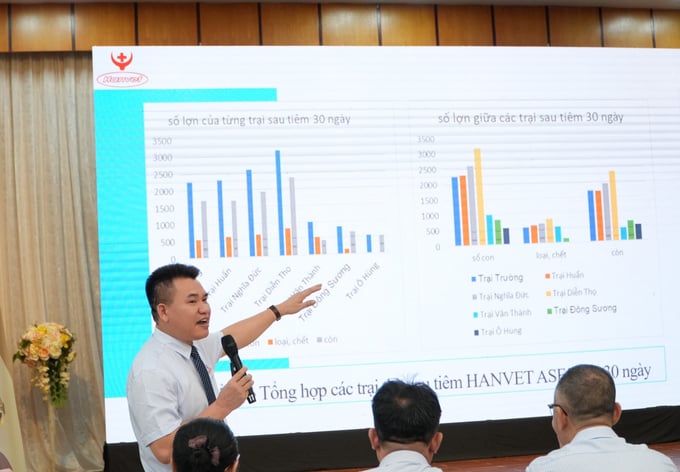
A representative of Hanvet Company introduced the results of vaccination experiments on pigs. Photo: Dinh Muoi.
The findings from laboratory studies demonstrate that the vaccination can safeguard around 90% of meat pigs, guaranteeing their safety until they are ready for the market with an efficacy rate ranging from 90% to 100%. The safety efficacy for breeding sows is higher, typically ranging from 95% to 100%.
Extensive trials conducted in locations with a high risk of outbreaks have demonstrated that immunity is established 28 days following immunization. The survival percentage for meat pigs, following immunization experiments, varies between 50% and 90% until they are ready for the market.
The survival rate for breeding sows, which includes replacement, awaiting breeding, nursing, and pregnant sows, is greater than 91%. Additionally, 95% of piglets are born normally, thrive well, and are successfully weaned. No viral presence was found in the boars' semen following vaccination.
Following the receipt of information from the Hanvet representative, the delegates engaged in discussions pertaining to several interconnected matters. These included the safety of the HANVET ASF VAC vaccine, potential complications, risks of cross-infection, protection against different variants, the compatibility of HANVET ASF VAC with pigs previously vaccinated with other ASF vaccines, as well as the signs, symptoms, and timing of ASF outbreaks in herds.
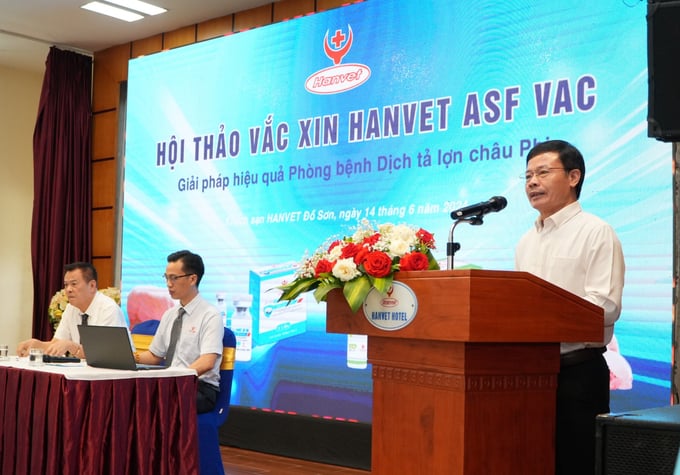
Dr. Nguyen Xuan Duong, Chairman of Vietnam Livestock Association shared about HANVET ASF VAC vaccine. Photo: Dinh Muoi.
According to Dr. Nguyen Xuan Duong, the Chairman of the Vietnam Livestock Association, Hanvet has made substantial advancements in the manufacture of livestock vaccinations, in addition to other companies that have obtained permission for ASF vaccines. Hanvet's goods undergo a thorough and precise development process, guided by scientific research and a sense of responsibility.
"Today, Hanvet has made preliminary advancements, persistently enhancing their research and proceeding with prudence. We anticipate that Hanvet, in conjunction with both domestic and international researchers, will persist in their collaborative efforts to achieve state recognition and widespread implementation within the livestock industry," stated Dr. Nguyen Xuan Duong.
African swine flu has had a profound impact on pig producers worldwide, causing widespread devastation akin to a cyclone. Our nation has witnessed the profound devastation of several farms, with tens of thousands of farming households suffering irreparable consequences, leading to a considerable decline in social welfare.
African swine fever (ASF) has lately had a resurgence in numerous provinces and towns, causing significant misery to farmers. This resurgence is particularly challenging since it coincides with a period of economic hardship and the beginning of a recovery in pig prices. The manufacture of an African Swine Fever (ASF) vaccine is currently a critical concern for authorities, industries, businesses, and connected bodies, due to its urgent necessity in serving the animal industry.
Translated by Linh Linh
![Turning wind and rain into action: [11] Ten years before storms, after every harvest](https://t.ex-cdn.com/nongnghiepmoitruong.vn/608w/files/news/2025/06/20/z6704423696987_15fd32ffc26d590d204d520c9dac6786-nongnghiep-140922.jpg)
(VAN) With WeatherPlus, every raindrop and every breeze carries a message. And if we learn to listen, the fields will no longer live in fear of the weather.
![Turning wind and rain into action: [10] Advancing accessible climate services for farmers](https://t.ex-cdn.com/nongnghiepmoitruong.vn/608w/files/linhnhp/2025/06/20/1911-z6704423696987_15fd32ffc26d590d204d520c9dac6786-nongnghiep-161854.jpg)
(VAN) Not only does it help farmers 'avoid droughts and rains,' the development of agricultural climate services also enhances their ability to proactively adapt to a rapidly changing climate.
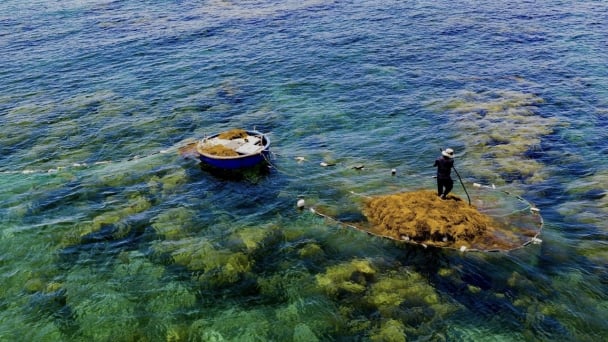
(VAN) With international assistance, the harvesting of sargassum seaweed in Quang Ngai has become increasingly regulated, thereby safeguarding marine life and ensuring the stability of coastal communities' livelihoods.
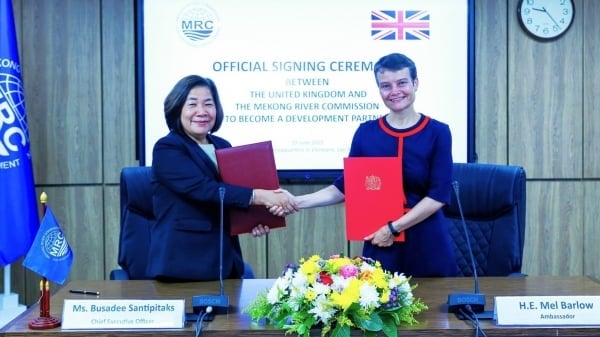
(VAN) On June 19, the United Kingdom officially became a Development Partner of the Mekong River Commission.

(VAN) Biodiversity is being threatened by traditional remedies made from wildlife. Traditional medicine and humans must change to live in harmony with nature.

(VAN) Agrifood investment and finance solutions for people and the planet.

(VAN) Microplastic contamination has become pervasive in seafood, posing unprecedented challenges for food safety and marine ecosystems.